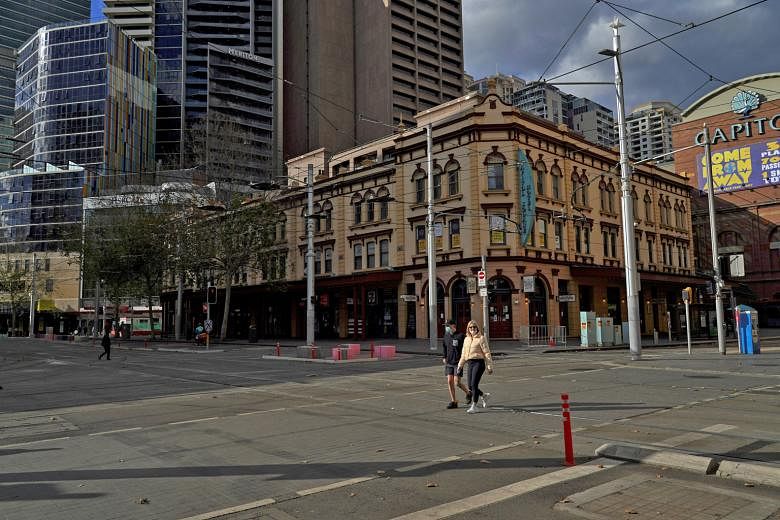ST PETERSBURG • Australia's largest city Sydney entered a two-week lockdown on Saturday and the Russian capital of Moscow announced a record daily death toll, as several European nations lifted restrictions despite the worrying spread of the highly contagious Delta coronavirus variant.
While vaccination drives have brought down infections in wealthy countries, the Delta strain, which first emerged in India, has fuelled fears that the pandemic may be far from over after claiming nearly four million lives.
Sydney's normally bustling harbourside centre was nearly deserted after people were ordered to stay home except for essential trips to contain a sudden surge of the variant.
The northern Australian city of Darwin, too, came under a hard two-day stay-at-home order yesterday amid a fresh outbreak linked to a remote gold mine.
Australia reported 38 cases of different Covid-19 variants late yesterday, 30 of them in Sydney, four in the Northern Territory, three in Queensland and one in Western Australia.
It was the first time in months that so many different regions in the country had reported new infections on the same day.
The Delta variant has also been fuelling rising case numbers in Russia, which is grappling with a deadly third wave.
Moscow yesterday recorded 144 Covid-19 deaths, a day after St Petersburg set the previous highest figures since the start of the pandemic.
St Petersburg has hosted six Euro 2020 matches and is due to host a quarter-final on Friday, with spectator numbers capped at half but still over 26,000 people.
"To stop the pandemic, one thing is needed: rapid, large-scale vaccinations. Nobody has invented any other solution," Moscow Mayor Sergei Sobyanin said.
Similar spikes in infections have been seen across South-east Asia.
Thailand will from today reimpose restrictions on restaurants, construction sites and gatherings in the capital Bangkok as it tries to contain a wave of infections that began in April when a cluster was found in upscale Bangkok clubs.
Thai Premier Prayut Chan-o-cha has said he plans to fully reopen the country by October, but this would require hitting a target of vaccinating 50 million Thais in four months.
In neighbouring Malaysia, Prime Minister Muhyiddin Yassin announced that a nationwide lockdown in place for about a month already will continue, and he gave no date for the lifting of restrictions.
Bangladesh also said it would impose a new national lockdown from today, with offices shut for a week and only medical-related transport allowed.
The Delta variant is now in 85 countries and is the most contagious of any Covid-19 strain identified, according to the World Health Organisation (WHO).
The pandemic appeared to be slowing globally, however, with the WHO on Saturday reporting the lowest number of new cases worldwide since February and decreasing deaths attributed to the virus.
Across much of Europe and the United States, curbs on daily life are easing as their vaccination programmes bear fruit.
Spain brought an end to mandatory outdoor mask-wearing on Saturday, although many residents in Madrid, where a major cluster has been discovered, are keeping their faces covered for now.
The Netherlands also ended its rules on outdoor mask-wearing, while easing restrictions on indoor dining and reopening nightclubs to people who have tested negative.
And Switzerland scrapped most of its remaining restrictions after Health Minister Alain Berset said that the country's use of Pfizer-BioNTech and Moderna vaccines gave adequate protection against the Delta variant.
Still, the Delta variant is so contagious that experts have said more than 80 per cent of a population would need to be jabbed in order to contain it - a challenging target even for nations with significant vaccination programmes.
Israel, which has one of the world's most successful vaccination campaigns, has seen infections linked to the variant surge since dropping a requirement to wear masks in enclosed public places 10 days ago.
After four days of more than 100 new cases a day, the Health Ministry reversed the decision.
The variant is also fuelling an alarming rise in infections in several countries across Africa, where cases as a whole jumped 25 per cent over the past week.
South Africa, the continent's hardest-hit country, warned on Saturday that soaring caseloads linked to the Delta variant were forcing the authorities to consider tighter restrictions.
"We are in the exponential phase of the pandemic with the numbers just growing very, very, extremely fast," warned top virologist Tulio de Oliveira.
In India, meanwhile, where the Delta variant was first detected around April, the human impact of the pandemic has been laid bare after seasonal flooding of the Ganges river flushed out shallow graves where hundreds were buried at the peak of the crisis.
Mr Neeraj Kumar Singh, an official in the northern city of Allahabad, said that almost 150 bodies have had to be cremated after resurfacing from the river in the past three weeks.
AGENCE FRANCE-PRESSE

